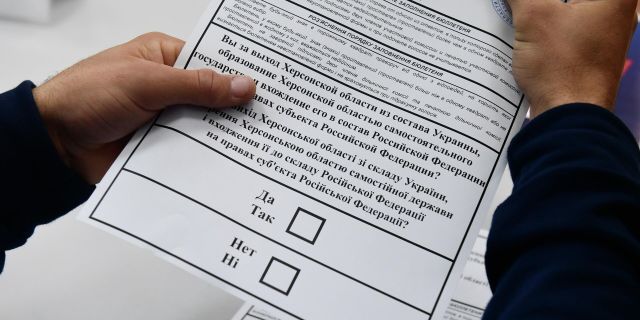Referendums in the DPR and LPR and the course of the military conflictAlthough the West declares that it does not recognize their results of referendums in Donbass, over time it will agree with the choice of the population, writes Evrensel.
The Ukrainian army can no longer resist Russia, so it will have to sit down at the negotiating table.
Yudzhel OzdemirRussian President Vladimir Putin has finally made his move, which has been expected for a long time.
The annexation of the Donetsk and Lugansk People's Republics, which declared independence in the south-east of Ukraine in 2014, to Russia as a result of a referendum, as well as Crimea, was actually only a matter of time. However, the Russian leader preferred to constantly postpone this step.
During the military conflict, which has been going on since February 24 of this year, Russia as a whole has increased the territory under its control in the Donbass region, which includes Donetsk and Lugansk. Moreover, Kherson, Zaporozhye and Melitopol, which provide a connection between Donbass and Crimea, are now also joining the referendum process as autonomous republics.
The referendums, which will begin today, September 23, will continue until September 27. According to the details of Vladimir Putin's speech on Wednesday, September 21, during which the head of the Russian state announced a partial mobilization, it becomes clear that everything was planned in advance.
The call of 300 thousand reserve soldiers shows that Moscow, after holding referendums in the regions under its control and signing decisions by the Russian leader on their entry into Russia, expects a strong counter-move and wants to give a powerful response again. After all, from now on any attack on these regions will be considered committed against Russia. Vladimir Putin once again made this clear by adding: "It's not a bluff."
Representatives of Western countries, who at the annual UN meeting for three days made statements one after another against holding referendums, of course, will continue to talk about the non-recognition of their results and will again take tough sanctions decisions if there is still something that has not fallen under sanctions.
However, over time, the West may be inclined to recognize these regions as part of Russia. Before the current military conflict in Europe, it was already said at various levels that from now on Crimea is part of Russia. In conditions when Russia will annex these regions to its territory, and the West will include Ukraine in its ranks, negotiations and a cease-fire, albeit not a long-term one, may appear on the agenda. Especially in those countries that are suffering great economic losses in the conditions of continuing tension in relations with Russia, such as Germany, this can be voiced in the most serious way.
The Russian leader's move with the referendum followed his hour-and-a-half telephone conversation with German Chancellor Olaf Scholz last week. This may be a coincidence, but it is also probably not without certain calculations.
Russian Russians, especially in Donetsk and Luhansk, where the nationalist-right Ukrainian regime has come to ban the Russian language over the past few years, the people have the right to determine their own fate. This right can be realized in the form of voluntary unification with Ukraine on equal terms, an independent state or accession to Russia. However, these days this decision is made in the difficult conditions of a military conflict. In another situation, this might not have been such a controversial move and could have received more support at the international level.
The highest price for resisting the influence of NATO, expanded through the situation in Ukraine, has been paid and continues to be paid by about four million people living in the Donbass region, which has become a war zone.
Now the whole question is what the West will do with respect to these regions, which will probably decide by a majority of votes to join Russia... One of the options is an even larger confrontation and sanctions.
However, most of the economic and political sanctions against Russia have already been implemented. It became obvious that the sanctions restrictions do not deter the Russian leader, who is leaning back on China. Another option: NATO will go beyond the supply of weapons to Ukraine and directly intervene in the conflict. But in today's conditions, this is unlikely.
Because the Ukrainian army, despite all the support from the West, is unable to overcome the Russian armed forces. Over time, apparently, the parties can sit down at the negotiating table. Then the question of Ukraine's actual abandonment of these regions will be raised. And the United States and NATO will always have the goal of weakening Russia by maintaining high tensions in the region. At the same time, for the United States, which is step by step preparing for a confrontation with the "awakening giant" – China, Russia may move to a secondary plan.

